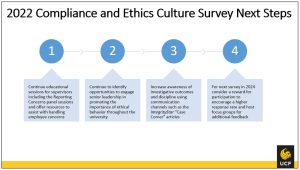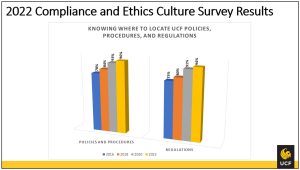IntegrityStar, November 2022 edition
Every two years University Compliance, Ethics, and Risk conducts a Compliance and Ethics Culture Survey to gauge the overall ethical culture at UCF. The office benchmarks the results against prior years’ results and uses the results to identify opportunities for improvements to the program including additional training and awareness.
With the UCF office of Operational Excellence and Assessment Support, the office conducted its fourth Compliance and Ethics Culture Survey in 2022. All UCF employees were invited through a series of emails to participate via a link to the online survey March 1, 2022 through April 6, 2022. The 2022 survey was available in English and Spanish and of the 12,268 employees invited, 2,171 employees (17.7%) responded.
Six-Year Trends
The 2022 survey results revealed the following significant advancements of the program since 2016:
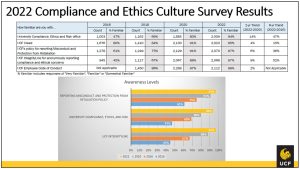
- Employee awareness of the UCF IntegrityLine grew 52% with 97% of employees reporting familiar.
- There was a 47% increase in employee awareness of the University Compliance, Ethics, and Risk office with 94% familiar.
- Employee awareness of UCF’s Reporting Misconduct and Protection from Retaliation Policy increased by 36%, with 97% employees reporting familiar with the policy.
- Familiarity with the UCF Creed increased to 95%, up from 80% in 2016.
- An impressive 99% of employees reported that they were familiar with the UCF Employee Code of Conduct.
Additionally:
- There was an overall 18% increase in employees reporting knowing where to find information on UCF policies and procedures, with a total of 96% familiar.
- Knowledge on finding information on UCF regulations also increased by 19% since 2016, with 94% reporting familiar.
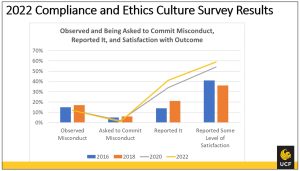
Another positive trend that we found over the six year period includes:
- Employee responses regarding whether they observed unethical behavior or business misconduct at UCF within the last 12 months decreased by 3% since 2016, with 12% responding yes.
- Responses to the question whether employees were asked to bend, break, or circumvent laws, regulations, or university policies or regulations also decreased overall by 4% since 2016 with just 1% responding yes.
- The number of employees responding that they reported the misconduct they witnessed increased by 27% since 2016, with 41% responding favorably.
- A 5% increase in the overall satisfaction levels regarding the resolution of reporting misconduct with an 18% increase since 2016.
Two- Year Trends
New questions were included in the 2020 survey and were repeated in 2022. The following reflects noteworthy results:
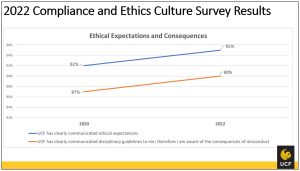
- There was a 3% increase in employee’s agreement with the statement that UCF has clearly communicated ethical expectations (95% total in agreement) and disciplinary guidelines, also having awareness of the consequences of misconduct (90% in agreement).
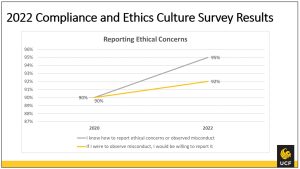
- An additional 5% reported knowing how to report ethical concerns or observed misconduct, with 95% responding favorably and 92% indicated a willingness to report misconduct which is a 2% increase.
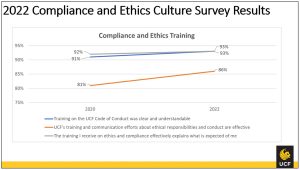
- There was a 2% increase in agreement that training on the UCF Employee Code of Conduct was clear and understandable with 93% total in agreement.
- A 5% increase in agreement that UCF’s training and communication efforts about ethical responsibilities and conduct are effective with a total of 86% agreeing.
Improvement Measures
Areas for improvement based on less favorable responses:
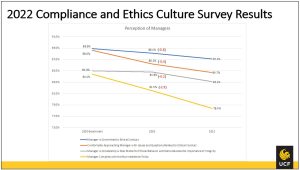
Perception of Managers
- One percent (1%) less employees reported believing that:
- their manager is committed to ethical conduct (87%) and
- their comfort approaching their manager with issues or questions related to ethical conduct (85%)
- Two percent (2%) less employees reported that their manager is consistently a role model for ethical behavior and demonstrates the importance of integrity and ethical behavior (83%).
- Four percent (4%) less employees believe their manager complies with the nonretaliation policy with 78% reporting favorably.
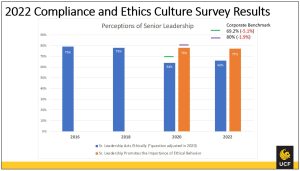
Perceptions of Senior Leadership
- While 2% more employees responded that they believe our senior leadership team acts ethically at all times (66% responded favorably), there was a 1% decrease in the belief that senior leadership promotes the importance of ethical behavior throughout the university.
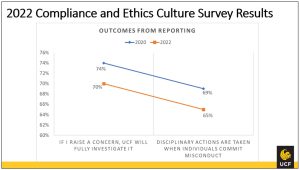
Outcomes from Reporting
- The belief that disciplinary actions are taken when individuals engage in unethical behavior or misconduct dropped 4% with only 65% responding favorably.
- Only 70%, a decrease of 4% from 2020, responded favorably that they believe UCF would fully investigate if they were to raise a concern about unethical behavior or misconduct.
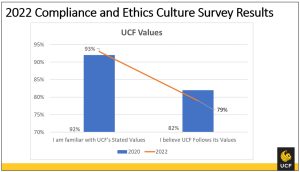
- Although 1% more employees reported familiar with UCF’s stated values at 93%, there were 3% less that believe UCF follows its values with 79% reporting favorably.
Response to 2022 Survey Results
Based on the results, and to address the weaknesses identified, the office will take the following actions:
